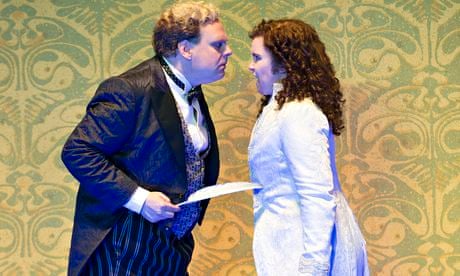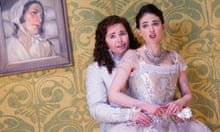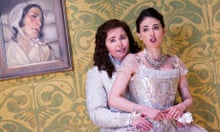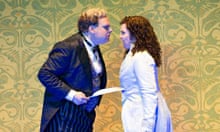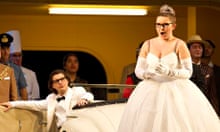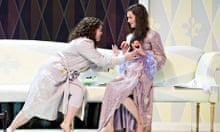A bunch of middle-aged men have recently taken it upon themselves to berate a 27-year-old woman because she has not achieved their own high standards as to what female physical perfection should be. If someone filmed a bunch of men doing that to a woman on a bus, it would be news. But these men should know better. They are all eminent opera critics, and they all feel that Irish mezzo soprano, Tara Erraught, was miscast as Octavian in Glyndebourne's current production of Richard Strauss's Der Rosenkavalier. They have not been backward in coming forward with their reasons why. None of them are to do with her singing, for which they have nothing but praise.
The Guardian calls Erraught "stocky". The Telegraph says she is "dumpy of stature", while the Independent says she's a "dumpy girl". The Financial Times reckons she's "a chubby bundle of puppy-fat". The Times, with particular charm, opts for "unbelievable, unsightly and unappealing", though that critic has had enough grace grudgingly to apologise for any personal hurt he may have caused.
Just in case you're wondering, by the way, Erraught, is obviously within the average range of weight and height for women. She seems in no way to push any outer limits as to the viability of the human form.
So it's not surprising that these critics have been faced with furious and fairly universal condemnation. A couple have leaped to their own defence, insisting that opera is a visual as well as a musical art form, and that they must be free to express their opinions about how a production looks as well as how it sounds.
I haven't seen the production myself, but I don't understand how Erraught's presence can be quite as marring to Der Rosenkavalier as it is reported to have been. I go to operas a few times each year. I have nothing like the depth of knowledge and understanding that these critics have. But I'm used to taking my cues about how I am to experience each character from the production itself, and not from the fixed ideas I drag into the auditorium with me. The whole idea is to check those in at the cloakroom and enter a different world for a while.
The wonderful thing about opera is that it's an immersive, sensual experience, not a naturalistic portrayal. Emotion is expressed in music, and everything else in a production is there, or should be there, to help the viewer escape into the realm under the proscenium, where different human standards hold sway. You believe in the essential spirit of a character because of what their voice tells you, not because their face and body are a walking sign saying "romantic lead". Or whatever. When the lady sings, she has the final word. That she is fat – or simply not svelte – may matter everywhere else. But not there. And that, surely, is why opera lovers have been so angry with the critics. Opera expresses human beauty in sound. It's not about perfect proportions and perfect faces. In that respect, opera is radical, free from convention, unique.
The point is to suspend disbelief and appreciate human value and achievement under a strictly different set of rules – different not just to "real life", but also to other drama. So it's quite a thing to say that a young woman's physical appearance is so intrusive that she fatally hinders the working of that magic. When even in opera, it is impossible to express the idea that beauty is in the eye of the beholder (in this case, the beholders being the two women who fall in love with Octavian), rather than some kind of universal exercise in box-ticking, something's wrong.
What these critics are actually saying is that their own ideas about who finds who sexually attractive should be universally applicable. Erraught makes an unacceptable Octavian because that Octavian would be unacceptable to them. (I say "their own ideas", although it is clear that those ideas are far from their own, but instead embarrassingly compliant with the ideas so heavily sold to them by the mainstream cultural zeitgiest.) In a rare demand that opera should be more like panto, the Telegraph's Rupert Christiansen even insists that Octavian should be played by a "principal-boy type". Which is where it gets complicated – or too complicated, at least, for the critics.
Octavian is a male character written for a mezzo soprano voice. So he is always played by a woman. Narratively, this makes sense as an indication that the women love Octavian because he speaks their language, because they are kindred spirits. The whole point, surely, is that he's an unusual man, not a typical one. It's amazing, really. These chaps aren't only experts on the kind of women that all men should consider attractive, they're experts on the kind of men all women should find attractive, too. What's more, this imagined expertise seems to have damaged their real expertise, which is, of course, in opera.
Opera has had more than its share of spats over the corpulence of the ladies singing, and even, sometimes, the men. One soprano, Deborah Voigt, even had a gastric bypass, basically to get into a little black dress. In recent years, in line with the temper of the times, opera has become more conscious of physicality in casting, just as critics have become less likely to make overt attacks on performers because of their looks. It's quite possible that all of these men assumed, probably subconsciously, that because Erraught was playing a man, all bets were off, and they could, for a nice change, relax and have a good go at a woman for failing to be the physical embodiment of the culture's cliched dreams.
No doubt none of these men would speak about women in the ugly, crude and dehumanising way that, say, premier league chief executive Richard Scudamore and City lawyer Nick West did, the latter referring to women as "gash". No doubt they would hate to be compared to Scudamore and his pal in any way. But they are similarly insisting on their right to maintain a personal standard of what essentially defines a perfect female, against which actual women can be judged. The Times's critic, Richard Morrison, says that the opera itself invites this. "The curtain goes up on the Marschallin, played by Kate Royal, gyrating – totally naked – in a shower of glitter," he says. "What is that except a blatant incitement for the audience (and critics) to take an interest in the bodies on stage as well as the voices?"
And that's it in a nutshell, isn't it? One woman gyrates naked, so it's OK to complain that all the other bodies aren't the same, whether they too are naked and gyrating, or not. One woman gyrates naked, so its OK to tell politicians, historians or opera singers that they are not physically up to the job of being female, or in this particular case, of being a man loved by a female so obviously more physically archetypal than he is.
It's banal, the idea that beautiful people can have no greater reward than the love of other beautiful people. Even more banal is the idea that no beautiful person would choose qualities other than physical beauty mirroring and matching their own in a lover. But it's actually sad when a group of intelligent men cannot appreciate even a fiction in which these banal supposed ideals are not pandered to, especially in an art form dedicated to celebrating human beauty in perfectly realised vocal talent, training and technique, not in looks. All of these men know that opera is neither literal nor naturalistic. They need to consider the possibility that their own imaginations failed them, because they were too busy assessing a female body to allow a female voice to persuade them of the power of love.
